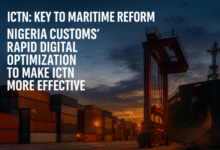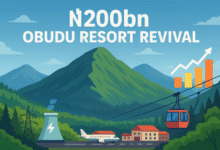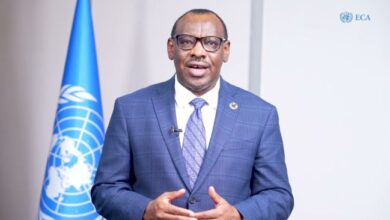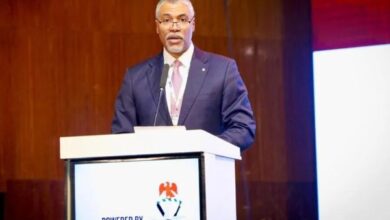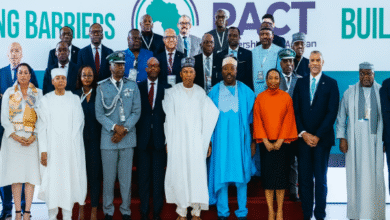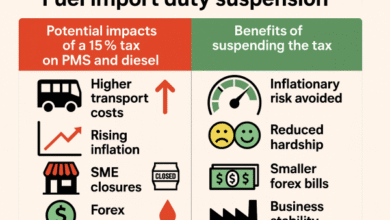From 9mobile to T2: Nigeria’s Fourth-Largest Telco Bets on Digital Reinvention
Nigeria’s fourth-largest telecom operator has shed its old skin. 9mobile—a brand born from crisis and resilience—has officially rebranded to T2, signalling what management describes as “a complete rebirth” and a decisive pivot toward digital-first, customer-centric services. This is coming after it transitioned its original name of Etisalat at inception.
At a high-energy unveiling in Lagos on Friday, CEO Obafemi Banigbe framed the move as more than a cosmetic refresh.
“This is not just a brand unveiling. It marks the beginning of a whole new chapter in our company’s history,” Banigbe declared.
“We are evolving into something greater, more ambitious, and aligned with the future.”
Why T2, and Why Now?
For a player that has seen its market share erode in the face of MTN, Airtel, and Globacom’s dominance, the rebrand is both a strategic necessity and a high-stakes gamble.
The new T2 identity represents agility, resilience, and boldness—qualities Banigbe insists are essential to survive and thrive in Nigeria’s fiercely competitive telecom market.
Unlike past “logo swaps” in the industry, this rebrand is tied to a deep operational shift. T2 is positioning itself not merely as a voice-and-data provider, but as a digital lifestyle enabler—delivering smarter, personalised services, integrated fintech solutions, and platform-based ecosystems across entertainment, e-commerce, health, education, and enterprise solutions.
Cloud-Native, API-Ready: The New Playbook
Banigbe revealed that T2’s transformation will make it a cloud-native, data-driven, API-ready operator—telecom jargon that, in practice, means faster rollouts of new services, deeper integration with third-party platforms, and personalised customer experiences powered by real-time analytics.
“Becoming digital is not just a cliché,” he stressed. “It’s about empowering customers with tools and platforms that improve their lives—putting control, convenience, and value directly in their hands.”
Lessons from the Past, Eyes on the Future
Few in the industry have forgotten 9mobile’s turbulent history—from its origins as Etisalat Nigeria, to its debt crisis and ownership shake-up in 2017, to years of sluggish growth. Banigbe made no attempt to rewrite that past.
“We are not ashamed of our scars. Every setback prepared us for this resurgence. We have returned sharper and more focused,” he said.
The CEO acknowledged that customer trust, network quality, and brand relevance must all be rebuilt—quickly. In a market where mobile money, 5G services, and digital ecosystems are shaping competitive advantage, T2’s ability to execute at scale will determine whether this rebirth sticks.
BRANDECONOMY INSIGHT: What This Means for the Telecoms Market
The rebrand to T2 could alter competitive dynamics if backed by:
- Aggressive investment in network infrastructure to match MTN and Airtel’s reach.
- Compelling digital services that go beyond basic connectivity—especially in mobile payments, IoT, and SME solutions.
- Partnership-led innovation, leveraging Nigeria’s booming fintech and content creation sectors.
If T2 fails to match its new image with real performance gains, it risks becoming another cautionary tale in an industry littered with ambitious but short-lived rebrands.
The Road Ahead
T2’s ambition is clear: to stop playing catch-up and start setting the pace in Nigeria’s digital economy. Banigbe put it bluntly:
“We are not playing catch-up. We are playing to win.”
Whether this bold pivot marks the true resurgence of Nigeria’s fourth network or just a well-branded pause in its decline will become clear in the next 12–18 months—a period that will test T2’s execution discipline, innovation pipeline, and market adaptability.
Competitive Impact Analysis: How T2’s Strategy Could Pressure MTN, Airtel, and Glo
1️⃣ Market Position Snapshot (as at mid-2025)
- MTN – ~38% market share; dominant in 4G, early lead in 5G, strong fintech arm (MoMo).
- Airtel – ~28% share; aggressive in data pricing, mobile money expansion, and rural penetration.
- Glo – ~25% share; competitive in price, deep fibre optic investments, but weaker brand loyalty among urban elites.
- T2 (ex-9mobile) – ~9% share; urban-focused, premium positioning history, lagging in network coverage and digital ecosystem.
2️⃣ Potential Pressure Points T2 Could Exploit
A. Urban Youth & Lifestyle Market
- Why T2 Has an Edge:
- Fresh identity + lifestyle branding could resonate with digital natives.
- Focus on API-ready, cloud-native platforms opens door for partnerships with entertainment, gaming, and fintech startups.
- Fresh identity + lifestyle branding could resonate with digital natives.
- Impact: Could erode Airtel’s and MTN’s dominance among Gen Z/urban millennials if backed by aggressive influencer-led campaigns.
B. SME & Startup Connectivity Solutions
- Why T2 Has an Edge:
- Targeting SMEs with bundled internet + cloud tools could undercut MTN Business and Airtel Business packages.
- Positioning as “agile” and “API-first” could attract tech startups frustrated with larger telcos’ bureaucracy.
- Targeting SMEs with bundled internet + cloud tools could undercut MTN Business and Airtel Business packages.
- Impact: Pressure on MTN/Airtel corporate ARPU (Average Revenue Per User) in high-margin B2B segments.
C. Digital Payments & Fintech Integration
- Why T2 Has an Edge:
- If T2 partners with existing fintech leaders instead of building in-house, it could leapfrog into the mobile payments race faster.
- Easier customer onboarding via in-app KYC could appeal to Airtel Money and MoMo customers.
- If T2 partners with existing fintech leaders instead of building in-house, it could leapfrog into the mobile payments race faster.
- Impact: Potential to bite into early-stage Glo Money ambitions and nibble at Airtel/MoMo’s growth in Tier 2 & 3 cities.
D. Customer Experience & Personalisation
- Why T2 Has an Edge:
- With smaller scale, T2 can deliver more personalised loyalty programs and faster customer service improvements.
- AI-driven offers and gamified usage could increase stickiness.
- With smaller scale, T2 can deliver more personalised loyalty programs and faster customer service improvements.
- Impact: Could spark a loyalty war, forcing MTN and Airtel to invest more in rewards and retention campaigns.
E. Brand Perception Battles
- Why T2 Has an Edge:
- “Rebirth” narrative could trigger curiosity and win back lapsed customers, especially disgruntled Glo or Airtel users.
- Leaner brand could be more relatable than “corporate giant” MTN or “price-warrior” Glo.
- “Rebirth” narrative could trigger curiosity and win back lapsed customers, especially disgruntled Glo or Airtel users.
- Impact: Short-term churn spikes for rivals if T2’s marketing lands with credibility.
3️⃣ Risks to T2’s Plan
- Network Coverage Gap: Without immediate investment in rural and suburban rollout, gains will be urban-limited.
- Execution Fatigue: Big promises + small resources could backfire if rollout is patchy.
- Price War Vulnerability: Glo and Airtel could slash data prices to suffocate T2’s momentum.
4️⃣ Strategic Moves to Maximise Impact
- Go Hyper-Niche First: Dominate urban digital lifestyle users before chasing mass market.
- Lock-in SME Segment Early: Launch “T2 for Business” bundles with free trials of cloud, CRM, and marketing tools.
- Form Aggressive Partnerships: Ride on existing fintech, edtech, and content apps instead of building from scratch.
- Customer Data Weaponisation: Use AI/ML to tailor plans, rewards, and offers in real-time.
5️⃣ BRANDECONOMY Verdict
If executed with speed, precision, and deep partnerships, T2 could claw back 3–5% market share within 18 months—mainly from urban Airtel and Glo users.
However, if execution falters, the rebrand risks being a well-designed footnote in Nigerian telecom history.


